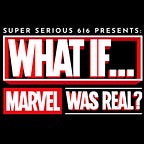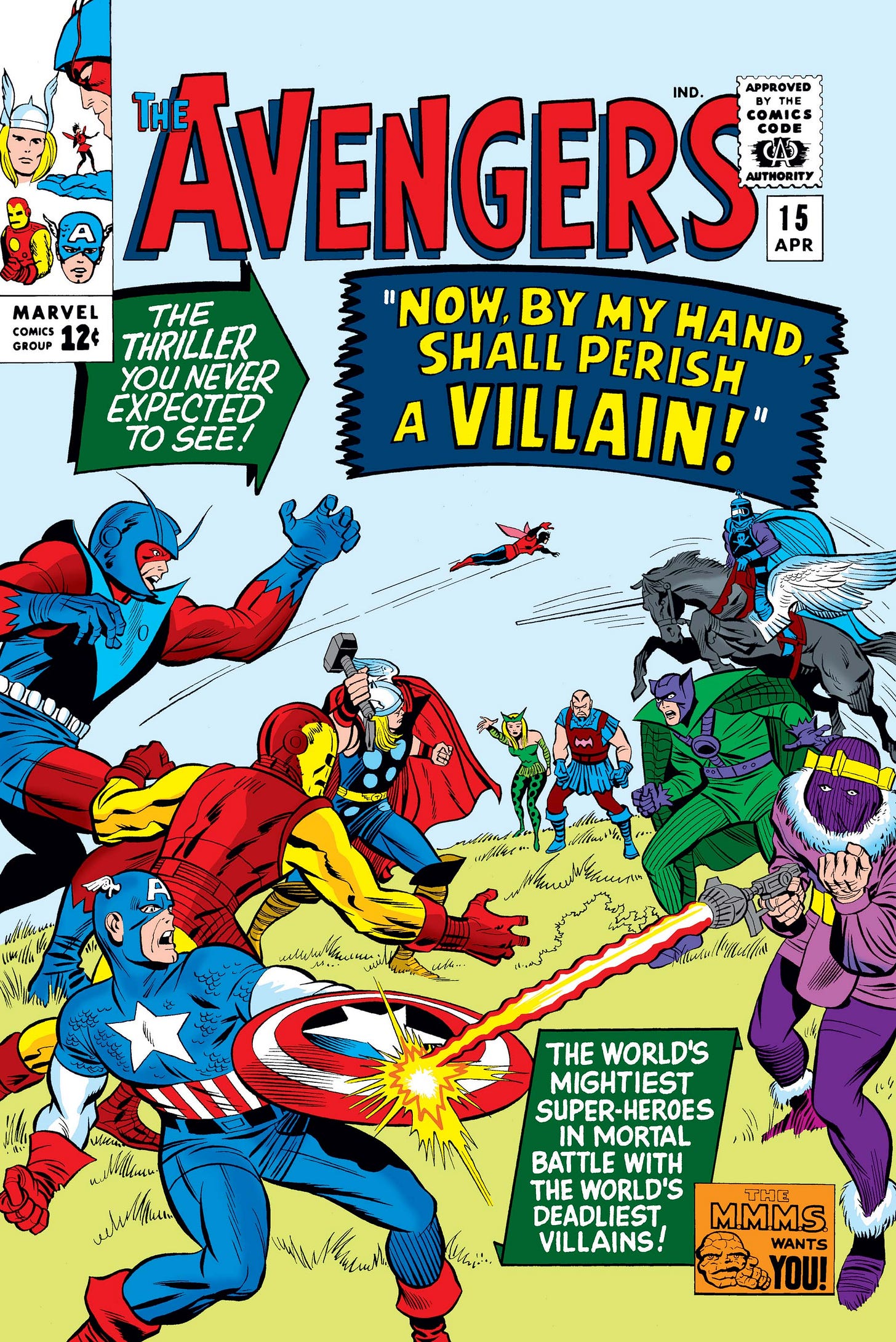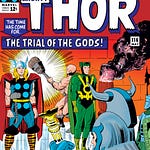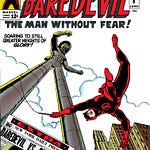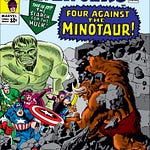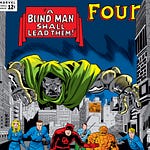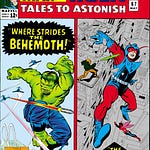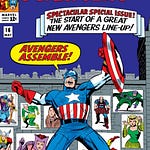In this episode:
Mike and Ed discuss the battle between the Avengers and the Masters of Evil - not to be confused with the Brotherhood of Evil. Ed explains the importance of differentiation in your brand - you don’t want to be confused for someone else. Mike wants to know if every superhero also has to be a tailor in their spare time. How many costumes does someone like Spider-Man own? Is his summer costume made with different material than his winter costume? Is the real benefit of being on a super team the laundry services? And why is Giant-Man re-branding yet again? The red and blue suits you, big guy, now stop fiddling with it and just embrace the fit!
Behind the issue:
This is the last full issue of this Avengers roster. The next issue, Avengers #16, completely changes the membership (more on that when we cover that issue). This issue ends on a cliffhanger but is wrapped up quickly in the next issue. The battle is used as the driver of why most of the team members decide to leave the organization. Also in this issue, Captain America battles Baron Zemo one-on-one and kills him. But that takes place in a far away country and is, at this point, unknown to the wider public.
In this issue:
Steve Rogers is contemplating a career change. As he does so, he notices the supervillains the Enchantress and the Executioner drive by, and he chases after them but they get away. Steve changes into his Captain America gear and reports back to the Avengers about the evil duo being in the city. They resolve to deal with them, but before they can do so, Rick Jones is kidnapped right in front of them by henchmen working for Baron Zemo. The Enchantress and the Executioner then break the Black Knight and the Melter out of prison and have them join their team with Zemo, the Masters of Evil. Iron Man and Thor do battle with the Black Knight and the Melter high above the city, while Giant-Man and the Wasp chase after the Enchantress and the Executioner at street level. The villains are ultimately defeated. At the same time, on a separate mission, Captain America locates Rick and frees him, with Zemo dying in the process by his own hand (accidentally).
Assumed before the next episode:
People are keeping an eye out in the streets for large muscular people in costumes, and then running for their lives so they are not caught up in a super-person battle.
This episode takes place:
After the Avengers have defeated the Masters of Evil.
Full transcript:
Edward: All right. That's what I'm talking about, Mike. We got the Avengers fighting a League of Evil super villains in the city. They're back to doing what we pay them to do.
Michael: Or somebody pays them to do , but definitely
Edward: our tax dollars at work. Mike, our tax dollars at work,
Michael: back to business, doing what we want them to do and not dealing with what was the last thing that they're caught up in, just. Regular,
Edward: regular, regular what wasn't like giant man dealing with the mafia, I just felt like know, like get, get, get back on track. We have police that can deal with the regular stuff, but when you have a guy who can melt walls and an enchant who's casting magic spells and an as guardian and executioner, now is the time to step in with superpower people.
Michael: That's right if we're anything Ed, we definitely believe in specialties and specialists. and superheroes are by definition specialists in super villains, not just, you know, rescuing cats stuck in trees and, and, uh,
Edward: oh, my, I would be mundane, angry if Thor was spending his time getting cats outta trees.
like, I feel like, like, not, not a good use of tax dollars. I dunno what we're paying him, but I figure we could pay someone a lot less to get the cats outta the trees. .
Michael: But that being said, if my cat got stuck in a tree, I'd rather Thor flew up there than I had to climb a tree and possibly break my neck trying to rescue the bloody cat. But anyways,
Edward: I, okay. Like you are not specialized in getting cats outta trees, that is not your specialty either. You stick to the law. Thor sticks to the super villains, and we can get the firefighters to get the cats out of the trees.
Michael: All right. I think we've settled on it, on what should happen, certainly with cats and trees, but also with superheroes addressing super villains and so, It's back to business as usual, not great that we had to have them as, you know, having evil super villains, the masters of evil coming back and battling the Avengers, but at least, yeah, fine. The Avengers are tackling this discreet issue.
Edward: Let's not even talk about the fact they're called the Masters of Evil. Again, we have the Brotherhood of Evil Mutants, we have the Masters of Evil, we have the frightful four. Like these guys are just throwing themselves out there as being, I am not to be trusted.
Michael: I know. Bless. I don't know. It's like good and evil are just, there's no like room for gray in here. Maybe there's . There's no misunderstanding.
Edward: The masters of Gray we're the brotherhood of ambiguity, .
Michael: How about misunderstood, tough childhood and trying to work through it. People together in a union, fighting for own version of justice
Edward: I will say as a marketing guy the bigger problem is, it's just confusing because right, there's the brotherhood of evil, but, and there's the masters of evil, like, I think. The evil is the key word in both those brands and it's easy to confuse them. Mm-hmm. So to be clear, the masters of evil who fought the Avengers this week there was the melter who could melt metal, not magni, who could move metal. Totally different people, unrelated, different teams, different names, but the same team name. Using that evil.
Michael: There's some overlap there I guess, but I think they maybe, well you gotta wonder why they haven't consulted with, an agency about branding, which would make sense.
Edward: So the key thing on branding is, number one is be descriptive. And I guess they're being descriptive. We are evil, mean people. And they've handled that part of it. But you also need to differentiate yourself. The other people who are doing similar work. And so if there's two teams of evil people doing evil super stuff, you just can't, you need to find a new name for yourself. And Frightful four does it, right? Frightful four does not use the evil name. They went to their local Theora and they've, looked up evil and they're like, you know what else is similar to evil is frightful. How about frightful instead of evil? And they're like, let's go with it. And there's no confusion there. But I think Masters of Evil and Brotherhood of Evil, to me, those are too close. And one of them should re. .
Michael: That leads to the next question. We talked about lawyers might specialize in super powered people and insurance might be responsive to it. I wonder if there's any, well you would know, are there any agencies that deal with this kind of stuff?
Edward: I don't think it's, the market's not big enough, Mike. The market's not big enough. Hmm. And, and especially if you're dealing with, nobody wants to be the marketing agency to. The criminals and the mafia. There's no mafia doesn't have a marketing agency working for them. They might have marketers as part of their team, but it's not like they need, they don't need them the way they need, lawyers and accountants.
Michael: I'm not saying that General Electric is evil or anything, but you know, , they, they, they definitely, and they, they don't practice
Edward: the, the General Electric of Evil .
Michael: No, but I mean like, like they're big corporations that, that, actually I don't wanna get sued by General Electric never meant nevermind about that. But, but regardless, I would imagine that there's agencies that would, for the right price would certain. Wanna be engaged by the Masters of Evil to say, let's call yourselves, maybe not the masters of evil, but the master, you know, the brotherhood of people. I don't know. Or something. Brotherhood of people. Some kinda, some kinda like, I said the, brotherhood of evil. Like the idea is like there's some kind of more palatable name that they could have to achieve their goals. I would imagine
Edward: they could take the name they have right now, instead of the Masters of Evil, just be like, How about just the masters? The masters, the masters of super, the ma, the masters of powers, take the other characteristics they have other than evilness and lean. Lean into those. .
Michael: Yeah. Like maybe like, they're really smart, I don't think if they're getting in fights with the Avengers, they need people to tell them that they're the antagonist in this dispute. Cuz the Avengers have clearly occupied the superhero world. Why don't you just call them some, call themselves something else? Like the masters or the, uh, the terrifics or something. It's the positive. Be positive by yourself, the public.
Edward: Take the Avengers name and play that. Like, they can be the Avengers, like they can, they're the anti Avengers and the anti Avengers. You could define yourselves as being the opposite of your competitor.
Michael: And leave it open as to whether they're in the wrong or not, that's what I find so confusing about the branding of automatically saying, we are definitely in the wrong, we are evil people. Evil, evil, evil. Or we are frightful, terrible, terrible people, , we just call themselves the amazing four, let people find out that they're bad. ,
Edward: surprise, also evil.
Michael: Surprised I was evil. But you know, we kind of had you there. You bought our action figures, because we're the amazing four hey Rob banks and try to destroy nuclear powered, power stations. But anyways. Mm-hmm. we're the amazings,
Edward: I think the part of the has become is we don't see a lot of rebranding we've seen groupings of superheroes that come together and created a new brand, but the Avengers haven't decided, oh, we're gonna change our name. Or the Fantastic Four haven't been like, you know what? We've, we totally made a mistake. There is a possibility we could add a fifth member . Um, we need a new name. Um, yeah. It seems like everybody's commit. Well, I guess with one exception, ant Man has rebranded, right? Right. But apart, but apart from Ant Man, everybody's basically stuck with the. Brand since they started. We have any superhero that's switched brands along the way, or super villain for that. .
Michael: No. And again, I kind of was being a little tongue in cheek about having agencies that might be involved in branding, but there's probably something to it, if not the name, certainly in the costumes or the outlook or the perspective on, or at least the narrative that they wanna advance. Because we do know that there are some superheroes who are more popular than others, why is Captain America more popular than Spider-Man? It might. because of the name. It might be because he's not covering his whole face. It might be just a costume, but, I'd imagine that there's something there. There's value in being popular and being celebrities as we know the fantastic force. Certainly there's a value in that and a financial benefit to that. So you think it might be worth their time to actually consult? Maybe a lot of them have, certainly the Fantastic four have already consulted with a brand expert and they say, you know, yeah, sure you might be limited in your membership numbers, but you're doing everything else right? You have a very clean, clear lines in your costumes. You're not hiding your face. You don't even have se secret entities. And that's led to them being not only popular, but making money from the whole enterprise. And you gotta wonder, maybe other people would. From it. Or they've already gone through it and just are just trying to play out the whole marketing plan.
Edward: We don't know what's going on behind the scenes. We can just see the effects and like I can say there are certain things that are pretty consistent in the world of branding that are important. Mm-hmm. , so things like affiliating your brand with good things. , right? So this is why we run advertisements. That's why beer commercials show people drinking beer and having fun. And now you say, oh, you know what, if I drink beer, maybe I will have fun too. Maybe I will be surrounded by attractive women. And I think there's no difference in superheroes where if Spider-Man is continually getting affiliated with bad things, we start to affiliate Spider-Man as being bad. And if Captain America's affiliated with winning World War ii, which was a pretty good thing that. Leans off onto his brand. So that's number one. Number two is brand longevity matters a lot too. So a brand that's been around for a long time, people tend to like the things that stick around. And part of that's a trust thing because if you have a brand that's brand new, you don't know whether to trust it or not. But if something's been around, like ivory soap has been around for 60 years or something like that, they have a pretty good consistent record on, they're gonna do, they're gonna make you clean. And I think that's part of the reason why Captain America is so loved is he's been around longer time and they, he's consistently stuck on message and delivered that same message over and over and over again, over an extended period of time. And so we can trust him. But Spider-Man, he's like a brand new dude who knows what's what he's gonna do.
Michael: Mm-hmm. . Mm-hmm. . Well, yeah. And of course, this is something you have an expertise in about branding. But that leads to the question then. But the question I asked earlier is do you think that most these of these superheroes have consulted with a brand expert?
Edward: No. No, of course not. No. they not talking to anybody. They peop, but like, just like most companies don't spend a lot of time with brand experts. They figure out things on their own, uh, and mm-hmm. and the biggest companies have lot. They're spending money on everything. But smaller companies, and I think most superheroes, you can think of them as fairly small companies. They're small, like little tiny startups trying to figure stuff out and they're not gonna have a budget to go. Spiderman doesn't a budget these spending on public relations people and a marketing team and a advertising organization and like they, they don't have that stuff. Most celebrities may have a publicist and a manager at best. And I think most superheroes are behind. .
Michael: Well then let's talk about the one superhero who seems to be constantly rebranding and who would probably benefit from having some assistance. Antman, I mean, giant Man. I mean, okay. , whatever he is. How many costume ?
Edward: Well, he's just had three. Right. So he had Antman and he was fairly consistent as Aunt Man. Yeah. And then he rebranded to Giant Man, and that was very confusing. Yeah. For a long time we didn't even know the Giant Man and Antman were the same person. And then, and now he has a new costume again, so this is. His second rebrand, and as far as I know, he's sticking with the name this time. He's not rebranding the name, just the look and. .
Michael: But it's sort of funny, so if you go through those cautions first, when he is ant man, he clearly looked like, he's small and stuff and it's just like a red costume and stuff. And then when he is giant man, he still had those sort of funny antennas on his, head that suggests like, all right, okay, and he's bigger, he's walking around and like all giant, he's a giant now. He's a giant ant. Like it's just like, why don't you just call yourself like big aunt or something, and then, cuz that's what he's like, why if you're now giant, man, when I think of giants, I don't think of having an antennas on their heads, but whatever. That's what he did and now he seems to have. Well, let me think about, look at the news. Did he, does he still have those antenna on his head in his new costume?
Edward: I don't even know. I haven't, I should have done more research. I feel like I haven't spent time really examining this new costume of his
Michael: Well, regardless, it's another rebranding and so that's where I'm wondering. Okay. If he, if this isn't part of a plan, then what is it? Is it just that he's like, I don't know, I don't say this, but insecure about his, you know, he's just like, oh gosh, doesn't make me look so good.
Edward: So I think it's like, Hey, stay. Staying with a consistent costume can't be easy on any of these guys. Now the advantage is they don't need to think of what they're gonna wear in the morning, but the disadvantages is how many costumes do they have to have? Like you, you and I, I think I have a fairly consistent brand in terms of what I wear. I don't wear, I'm not gonna show up to work in like, I don't know, green tights. I'm gonna wear the consistent clothes every time I go to work. , but it doesn't mean I wear exactly the same clothes. I might have a blue suit or a black suit. I might wear a white collar or a blue collar. I feel like I can change up within a range. Yeah. It feels like superheroes don't do that and maybe giant man is just trying that. He's like, you know what, today, I just didn't feel like the antennas.
Michael: Well, okay. Just to loop back on that, I've looked at the, the reporting still going with the antennas, , I don't get it, but regardless,
Edward: he's, keeping, so there you go. That's his consistent theme. Yeah. He was like, he was an ant man to a giant man, to a, new giant man, and he kept like the ant theme all the way along. And, that's a branding choice too. So you take some brand elements and you carry them forward so people can still, when they walk into the store to pick up their. Tide, the new Tide brand looks different, but it looks similar enough to the old brand. They're not gonna get confused.
Michael: Okay. So he is following some of the rules that you've identified, but when you're talking about this costume idea, so leaving aside the branding issue is just how is it working with costumes? Because, you know, like I like to exercise as you, as you know, and so do you, and I've got a number of outfits that I use. For any other reason than practicality. If I exercise, I need to wash the clothing right away. So these guys are like, let's say take Spider-Man for example. That guy is swinging through the city. He must be sweating like crazy . And you think he just goes home? Is he doing laundry every single night,
Edward: Do you think he has a summer version of his costume and a winter version? When it's cold out, he wears his warm tights and then the summer he's wearing I dunno, really, really thin tights.
Michael: You'd have to, it'd be a winter weight and a summer weight but also on top of that, in the summer, you probably have to have way more versions of this costume . And so who's making it for him? Or is he just laundering it every night? Who made it to begin with, but then. , who's clean, who's continuing to make other costumes for 'em, or same version of the costume, which looks complicated. You see all the design elements and then clean.
Edward: I guarantee if I was a superhero, I would be wearing block colors. There's no way I'm gonna making, these are like small black lines on my, I'd be like, I'm gonna wear red and I'm gonna go buy some red stuff and just make a red costume. The idea of sewing together the blue and the red, and then to your point, not doing it once. It's not like the guy behind Spider-Man's mask is, maybe he's a tailor for his side job, but, he's not making one costume. To your point. He, he must have dozens of costumes for the different seasons and, for the smell. If he has so many and to make them all identical.
Michael: Yeah, it's quite an enterprise and to my knowledge, I don't think Spider-Man makes money from what he's doing so it's quite an investment. It's not just one costume. Maybe he could have gotten away with having a few of those costumes if he just was dressed in all black, for instance, with a funny mask and maybe you don't to, well, he had to wash the mask every night. If you're wearing this full head on mask, It probably It would stink too.
Edward: Yeah, like crazy. And maybe that's, maybe he only has one or two costumes and he just washes them every night. He goes home. He has his own, he's clearly not taking them to like a public, dry cleaners. He probably has his washing dryer in his house and he's just running the washer and dryer. Every he gets home, takes off his outfit, washes it, dries it, and it's ready to go the next day.
Michael: Or has the most discreet laundromat in the world, , you know, in addition to the most discreet Taylor, but that's not just him, right? It's all the, these heroes, they present with the same costume. And if we're comparing them to say, The police or the military, they have multiple versions of their outfits when they're on duty, when they have to wear outfits for work. It's mindblowing to me. So let's go to a team element, I'd imagine that, if you want to find out, I suspect they all know who each other are on this, on the Avengers. So we wonder if, find out who they were. I bet if they all are having their costumes washed by somebody or they're having mul tailors, , you know, prepare their costumes for, somebody's gonna speak about it. You know what I mean? It should, they should find out. Oh,
Edward: well the Avengers are different though, right? The Avengers, we know they we're close with Star Corp. I'm sure Star Corp has like a supply of tailors and stuff to make these costumes, right? So whatever giant man's secret identity is, he's not taking the costume to a tailor a secret identity. He's just passing it into the, through the stark corpse team of people and they make the costume. They probably have industrial cleaners that take care of it every night for them. I think that's all very
Michael: standardized. . Can you imagine? What's your job? It's star carp. Okay, I've got a really top secret job, but job, I can't talk about it. And then as this man's telling his wife, I can't even talk about my job. It's star carp. I just cannot tell you. I can't tell you what I do. And then he's sitting alone in a dark room. He's like, I wash giant man's clothing. .
Edward: I get, I get, that's what I do. I get the stand. You think your trouble tough, he was attacked by a lava monster. Getting lava stains out of these costumes is impossible.
Michael: yeah. It's just like it. But that's what it would have to be. , it would be top secret, right? To keep his identity secret. So whoever's washing his clothing would have to like oh. Under, under penalty of like imprisonment. Don't tell, you can't tell anybody. You know anything about Captain America's the underwear he wears outside of his pants or whatever. It's just wild to me. It's just what a job.
Edward: Well, I think I, we figured out the number one recruiting technique. I feel like if I'm an independent hero now, the number one reason to join the Avengers is not the money. It's not the fame , it's the laundry service.
Michael: Sign me up, Eddie. Sign me up.

